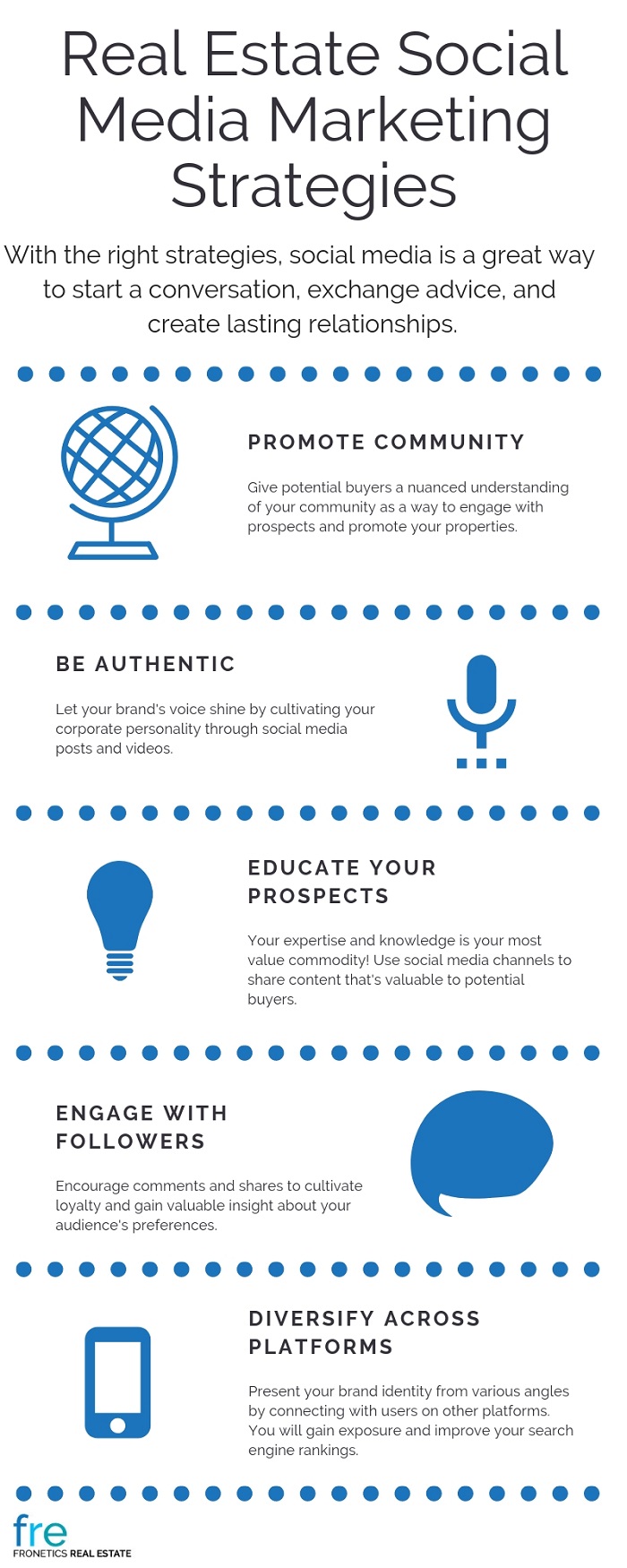Posts Tagged "best practices"

Infographic: Real Estate Social Media Marketing Strategies
Social media for real estate marketing is one of the most powerful tools out there. Our infographic will help you figure out the best social media marketing strategies—and the mistakes to avoid.
We’ve said it before, and we’ll say it again: real estate marketing and social media are a match made in heaven — when used correctly. With the right strategies, using social media for real estate marketing is a great way to start a conversation, exchange advice, and create a lasting relationship with prospects.
We can’t stress enough that to be effective, social media needs to be done right. Bubba Mills, chief executive officer of Corcoran Consulting & Coaching advises, “done right, social media can increase your trips to the bank. Done poorly, it can drive you to the poor house.” Take a look at our infographic with social media do’s and don’ts for real estate marketers.
What you should be doing: social media marketing strategies
Promote the community, not just your properties
Renters, buyers, and investors are looking for more than just a property — they want to know something about the place they’re considering living or investing in. Too many real estate blogs just skim the surface of what communities have to offer. Making use of social media platforms to give potential buyers a nuanced understanding of your community is a great way to engage with prospects and promote your properties.
Be authentic
Social media for real estate marketing is all about the personal. Users on these platforms are looking to connect with the real people behind the brands they follow. Part of building your brand is about discovering and cultivating your “corporate personality,” particularly when it comes to social media. Find your brand’s voice, and let it shine through.
Educate your prospects
You may not expect it, but social media users actually like educational content. According to the 2018 Sprout Social Index, 59% of customers express greater trust for “posts that teach” on social media. Educating your audience is also at the core of content marketing — at the end of the day, your knowledge and expertise is your most valuable commodity — even more so than your properties. Use your social media for real estate marketing to share content that’s valuable to potential buyers and renters, whether it’s buying guides, case studies, or local statistics.
Engage with your followers
It may seem painful obvious, but too many real estate marketers forget that social media is just that: social. When followers engage with your posts, always reply! Encourage comments and shares, and join the conversation. Not only is it a great way to cultivate a loyal following, but you can also gain valuable insights into your audience’s preferences.
Diversify across platforms
While Facebook still reigns supreme in the social media universe, if you aren’t connecting with users on other platforms, you’re missing out on huge opportunities. While each platform requires its own content and posting strategy, you’re essentially presenting your brand identity from the various angles allowed by different platforms. Not only that, using multiple social media platforms helps improve your search engine rankings.
Steer clear of these practices
Overzealous advertising
Nobody likes pushy sales language, especially on social media. Steer clear of posts that do nothing but overtly promote your properties. Instead, focus on educating your audience, and answering their questions.
Forgetting the visual
Social media is all about the visual, especially video. Be sure to include relevant images with posts and use video whenever possible.
Assuming that just because you’re online, offline rules don’t apply
It may seem obvious, but it’s all too often forgotten. This is a good rule, and an easy metric by which to judge any content before posting: Your interactions online should measure up to professional interactions you would have in person.
Reposting without checking
Re-posting content that’s of interest to your audience is a great way to promote discussion and engagement. But don’t get sloppy. Remember that even if content didn’t start with you, if it’s posted on your company’s social media accounts, it represents your brand and properties. Make sure content is well-researched and from reliable sources. Want to re-post something controversial? Just be sure to include a disclaimer or explanation in your post.
Forgetting about emotional intelligence
Never forget that behind every social media account is a human being. The bottom line: bring emotional intelligence to your social media management. Take the time to address any issues with compassion and understanding.
The takeaway
With the right strategies, social media is an extremely effective tool for real estate marketers to promote their brand and properties. But it does require a significant investment of time, resources, and creativity. Start connecting with your audience, and watch your brand grow.
Related posts:
- Social Media Can Be a Strategic Weapon in Real Estate Marketing
- 5 Tips for Building a Successful Real Estate Social Media Marketing Program
- Must-Know Social Media Strategies for Real Estate
Posts Tagged "best practices"

6 Social Media Don’ts for Property Management Companies
Committing these social media don’ts when managing a property may get you in a heap of trouble.
It’s easy to get bombarded with suggestions on how to interact with your audience on social media. In fact, social media can be particularly tricky for property managers: for example, many tenants will bash your property for all the world to see for small issues or in an attempt to get a free month of rent.
But amid the endless barrage of ideas for what to do, it’s worth remembering that not all social media engagement is equal. Just as shying away from social media isn’t a good strategy, it’s also important to remember what not to do.
Let’s look at 6 specific don’ts for keeping your proverbial foot out of your business’ mouth online:
Social media don’ts for property managers
1. Don’t assume that just because you’re online, offline rules of communication and conduct don’t apply.
It may seem obvious, but it’s all-too-often forgotten. This is a good rule, and an easy metric by which to judge any content before posting: Your interactions with current and potential tenants online should measure up to professional interactions you would have in person.
2. Don’t re-post, re-tweet, re-gram, or re-share external content without a thorough check first.
Re-posting content that’s of interest to your audience is a great way to promote discussion and engagement, especially for the highly social business of real estate marketing. But don’t get sloppy. Remember that even if content didn’t start with you, if it’s posted on your property’s social media accounts, it represents your business, and can reflect on your property and professionalism. Make sure content is well-researched and from reliable sources. Want to re-post something controversial? Just be sure to include a disclaimer or explanation in your post.
3. Don’t forget that emotional intelligence is just as important for businesses as for individuals.
This one is especially key for real estate marketers, since real estate decisions are so personal. Never forget that behind every social media account is a human being. The bottom line: “Bring emotional intelligence to your social media management. Take the time to address any issues with compassion and understanding.”
4. Don’t ignore comments.
Social media is all about engagement with your audience. Yes, responding to every comment takes time and resources, but it is well worth the effort. A comment ignored sends the message that you don’t feel that your reader’s question, concern, or observation is important. Use comments as the opportunity they are to interact with your followers, and show them that you are ready and willing to address any issues they may have.
5. Don’t delete negative comments.
Another cardinal sin for real estate. Once it’s online, trust that people have seen it. Deleting a complaint will only make your business appear insensitive and evasive. Addressing negative comments demonstrates that your company is proactive about resolving issues and taking care of your tenants.
6. Don’t forget the basic principles of common sense and good judgment.
This one comes from John P. David of David PR Group. It seems like another obvious one, but people and businesses violate this principle all the time. Always have at least two pairs of eyes on everything you are going to post, and anything remotely controversial should be thoroughly vetted by as many people as necessary. When in doubt, David says, don’t post.
If your company has committed any of these social media don’ts in the past, don’t panic. These platforms offer an ideal place for renewing and tweaking your image. Invest in the creation of a good social media policy. Don’t give the enormously important task of social media management to a summer intern. And, for goodness’ sakes, remember you’re a human talking to other humans.
Related posts:
-
Social Media Can Be a Strategic Weapon in Real Estate Marketing
-
4 Tools for Determining the Best Time to Post on Social Media for Your Property
-
4 Steps to Building a Successful DIY Content Marketing Strategy for Real Estate
Posts Tagged "best practices"

Your Content Should Not Include a Sales Pitch. Do This Instead.
Trying to pass your sales pitch off as content will only hurt your content marketing efforts. Start helping potential buyers instead.
Think your blog is a refreshing new way to highlight your properties’ selling points? Do your blog posts include verbiage like “competitive rates,” “prime location,” or “investment opportunity?” Stop right there. Everyone you reach probably knows right away that you are trying to sell them something, and they will quickly move on.
As counterintuitive as it may sound, being “salesy” will make potential buyers look elsewhere, or run in the opposite direction — perhaps to your competition. The best way to win buyers and renters is to stop trying to sell. Content that helps prospective buyers envision themselves in your property is what will grow your business.
Nobody welcomes a sales pitch
Admit it: you tune out anyone that comes across as trying to sell you something. You get emails, voicemails, and social media updates with “information” that is really a not-so-cleverly disguised sales pitch. What do you do? Most likely you hit delete, or you do not read past the first sign of a sales promotion.
So you know deep down that “salesy” does not sell. Yet according to a recent study of 500 global marketers from the Economist Group, many content marketing programs are doing just that: being promotional throughout their content efforts. In fact, 93% of the marketers surveyed said they directly connect content to a specific product or service.
Prospective buyers see right through this trick. Like you, most of your potential investor base is turned off by an overt sales pitch.
Focus on your audience to increase yield
So what should your content be doing? Rather than forcing your properties on your potential investors, take the time to answer their questions. Be the expert advice they are seeking. Help them envision themselves in one of your properties. You can do this by:
- Keeping content informative and educational. Your content should hold value for your readers.
- Letting your content demonstrate expertise. It should give the reader a favorable impression of you and your real estate business. They should walk away trusting your ideas.
- Educating your readers about the amenities nearby and the neighborhood. Offer information about things to do nearby or events that make your location ideal for your target audience. For example, music lovers will love to know that they could be living near a concert venue; or parents will want to know about the local school system.
The philosophy of content marketing is to offer help, to educate, and, at times, to entertain your target audience. This is accomplished by focusing on your potential buyers’ needs and interests, not by overtly pitching your properties. When your buyers understand you’re not trying to force a sale at any cost, you gain their trust and respect, and this is what brings in sales.
Related posts:
- Marketing vs. Sales: Why There Shouldn’t Be a Competition
- Content Marketers: Don’t Fire Your Sales Staff
- Most B2B Buyers Use Social Media in Their Research





